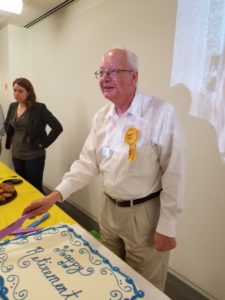There is no doubt about it. President Donald Trump’s latest tweets have rightly triggered a firestorm of disgust and angry responses. The personal attacks on MSNBC reporters Joe Scarborough and Mika Brzezinski have revealed a level of meanness and misogyny even Trump’s most craven defenders find impossible to ignore, with the exception of his White House press team, whose jobs, of course, depend on continuing to justify whatever he says. Thus, we have deputy press secretary Sarah Huckabee Sanders reminding us that, when Trump feels attacked (read “criticized”), he feels compelled to “fight fire with fire.” The problem is that he typically goes off the rails with comments of little substance or truth that would cause most other people to be fired and led out of their office by security. But he is, after all, the President. The people hired him. Or at least, that portion of the public voting in the right places to comprise a majority of the Electoral College even as he lost the popular vote by roughly three million.
My focus in this essay, however, is different from all that, although connected to it. I do not intend to reprise Trump’s acid tweets or analyze or parse or dissect them. My target is certain members of the television punditocracy who should know better and are insulting senior citizens in the process of criticizing Donald Trump. The fact that Trump is their target does not blind me to the ignorance of one statement some reporters have repeated so often I have not kept track of exactly who has said it or how often: “Donald Trump is a 70-year-old man, and 70-year-old men don’t change.”
Poppycock. This is a lazy excuse for failing to take a closer look at the real problem in his case. It is also a display of ageism that should not go unchallenged, certainly not any more than Trump’s misogyny. It is an expression of bias that needs to stop.

Slicing the cake at my APA retirement party, May 31. Not that was I about to disappear to a Florida golf course. Photos by Jean Schwab
I will reveal a personal stake in this debate. In little less than two and a half years, I will be one of those 70-year-old men. At 67, it is not just that I feel very little in common with Trump’s world view. It is that I know in my gut that I remain capable of change, that I have core principles that I hope will not change, and that I have one fundamental quality that Trump appears to lack—that of spiritual, moral, and intellectual curiosity. I approach 70 in the humble knowledge that I do not know everything, have never known everything that matters, and that I never will know everything that matters. I also approach 70 in the certainty that my thirst for new knowledge must remain until my last breath, barring any mental deterioration that might forestall such curiosity. I recall a friend of mine, who had read a biography of former U.S. Supreme Court Justice Oliver Wendell Holmes, telling me of book, Honorable Justice (by Sheldon M. Novick). Although the passage does not appear in that book, he noted a story in which newly inaugurated President Franklin Roosevelt is visiting the retired 92-year-old man and finds him reading Plato.
“Why do you read Plato, Mr. Justice?” Roosevelt asks.
“To improve my mind,” Holmes responds.
Which gets us to the problem of the current President. It is commonly said that he does not spend much time reading. Reading is one activity that informs learning, and learning inspires change, and therein lies the problem. We have a President who is so certain of his own superiority, who, on the wings of inherited wealth, has spent so little time being challenged on his core beliefs, that he has not acquired the habit of intellectual curiosity. This is the only trait that truly explains his poorly informed intransigence on climate change, immigration, election fraud, and numerous other issues where his depth of knowledge often appears paper-thin. It also explains his intense, narcissistic preoccupation with personal image reflected in comments about other nations laughing at “us,” and in his perceived need to strike back at anyone who merely disagrees with him, however honest and honorable that person’s disagreement may be.
To what can we attribute this sad state of affairs? Clearly, not just to Trump himself. After all, despite the distortions in popular will wrought by the Electoral College, no one can win the Electoral College without being at least close to a plurality of the popular vote. No one with a weak base of voter support can even hope to win the nomination of either major party in the United States. Inevitably, we must look at the nature of the support that launched Trump into the White House.
There can be little doubt that some of that support involved a level of dislike or dissatisfaction with Hillary Clinton that allowed voters to overlook the manifold shortcomings of Donald Trump, although polls surely indicate that many are now reassessing that comparison. Let’s be honest. Clinton had her own baggage and an imperious style that turned off a large part of the electorate. She could have spent far more time with blue-collar voters in the Midwest but chose not to. Whether Sen. Bernie Sanders could have beaten Trump, we will never know. History does not afford us the luxury of testing such scenarios. Sanders did not win the nomination, and there is little more to be said. Better luck next time.

Colleague Richard Roths (right), still stirring the waters and challenging conventions in his own retirement, alongside Benjamin and Rebecca Leitschuh, former students (of both of us) and co-workers (of mine), at my APA retirement party.
What I want to emphasize, however, is that Trump’s lack of intellectual curiosity, and his remarkable ability to tune into similar qualities among people very unlike him—the working-class voters worried about job security—reflects a sullen streak in American culture that has long glorified ignorance. Mind you, I am not saying that white working-class voters all fall into this category. I emerged from that environment. My father was a truck mechanic. I have met and known many union members and leaders with much more generous and positive attitudes. (I am married to a Chicago Teachers Union activist.) I am speaking of a particular tendency that can be found anywhere but tends to assert itself in uncertain economic times and under certain cultural circumstances, such as those highlighted by J.D. Vance in Hillbilly Elegy.
There is a cultural tug-of-war within America that is as old as America. It is between the intellectual innovators and their curiosity and all the changes they have wrought that have launched this nation to international leadership in technology, literature, and science, and those who willingly disparage the value of education, knowledge, and curiosity, whether out of jealousy or resentment or stubbornness. There is an element of social class attached to it, but more often it transcends class. Sometimes, aspects of both traits can be found in the same person. For all his innovative genius in science and politics, Thomas Jefferson remained a racist to his dying day. On the other hand, another “70-year-old man,” his contemporary George Washington, rose above his heritage long enough at the end of his life to free his slaves, upon his wife’s death, in his will, believing that the institution of slavery would need to wither away. Jefferson did no such thing.
So, we fight this war within ourselves at times, and as we do, we need to acknowledge it in order to overcome it, so that our biases are not petrified in old age. Trump seems to have chosen the opposite course. Unfortunately, he won election by tapping into an anti-intellectual streak in American politics that runs rampant across age groups, although we can hope that the worst biases are dying off among the young. But beware of the mental calcification that can start at an early age.

Deene Alongi, to my right, will begin managing speaking tours for me this fall. I may have a few things to say!
Seventy-year-old men and women can readily change. Having retired from APA just a month ago, I am rapidly acquiring new routines, setting new goals for the coming years, and trying to think new thoughts. Like Holmes, I cannot wait to read books new and old, and I want to remain intellectually challenged. I hope everyone following this blog has similar aspirations. It is the only way we will keep our nation, and indeed the entire world, moving forward and confronting challenges in a positive way.
And I don’t want to hear one more ignorant reporter talk about how “70-year-old men don’t change.” To them, I say, look inside yourself and ask why you are saying such a thing. Is it because you anticipate being stubborn like Trump when you reach his age? Perhaps you have some biases of your own to overcome.
Beware: From now on, I may start recording reporters’ names when I watch the TV news and hear comments about old men not changing. And I will call them out when they repeat their ageist slurs.
Jim Schwab




